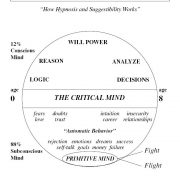31 Scary Questions to Ask Yourself

It’s all about scary this week as we approach Halloween and Day of the Dead.
It’s a time when it’s fun to be scared, as long as we know that it’s just a movie, or someone dressed up as the walking dead.
Truth is, there are plenty of really scary things out there. But by far, the scariest things are those that we hide from ourselves, the things that we are afraid to deal with.
Unresolved issues that haunt us, pain we can’t seem to release, resentment that traps us in unhappiness. These are the monsters under the bed, the goblins that we spend so much energy keeping locked in the closet, for fear of what they might do if looked at them.
Of course, once we turn on the bedroom light, look under the bed and throw the closet door open, we find that there is nothing to fear.
Shining the light of our awareness on those things that we don’t want to deal with allows us to see them clearly.Then we can take the opportunity to clean them up or straighten things out.
Asking yourself a few scary questions can help you transform an unseen ghoul into Casper the Friendly Ghost. (Who really just wants to lend a helping hand.)
Ask yourself these 31 scary questions and see if any of them make you a little freaky. If so, perhaps you are starting to exorcise some demons! Keep asking yourself those questions and see what comes up.
31 Scary Questions to ask yourself.
- Am I happy?
- If I’m not, am I waiting for something to happen to be happy?
- Is it possible for me to decide to be happy now?
- Do I know what I want?
- Have I given up on getting the things I want that are truly important to me?
- What fear keeps me from living the life I want?
- Have I become cynical, negative, or resigned?
- Do I like myself?
- Am I able to quickly name 10 great things about me?
- Am I taking care of myself?
- If no, do I feel I’m worth taking care of myself?
- Am I getting the love and attention I want and need?
- Do I have fun regularly?
- Do I have fulfilling social interactions?
- Am I expressing myself honestly and authentically?
- Is there someone I need to forgive?
- Is there resentment burning inside of me that I need to resolve or express in a healthy, productive manner?
- Is there a negative belief that I need to release or let go of?
- Is there a change I need and should make NOW?
- Why am I here?
- Is there a valid reason for the things that I am doing that are stressful and overwhelming?
- Am I giving me the me time I need?
- Do I have regular moments of peace, calm and tranquility?
- Do I have frequent feelings of gratitude?
- Do I complain a lot?
- Do I hang around negative people that bring me down?
- Is my work meaningful and fulfilling?
- Do I compare myself to others and find it creates despair?
- Am I caught up in a lifestyle that I feel is not meaningful to me?
- Am I happy with the answers I have to these questions?
- If not, what can I do today to change?
Perhaps a few of these scary questions brought up some stuff. You might not be able to answer some of these scary questions in the way you feel you should or would like to.
If so, copy those scary questions and paste them into a word or notepad etc. document. Delete all the questions that don’t have an emotional charge for you. Keep deleting until you have about 5 or 10 of the biggest, baddest scary questions that are giving you the heebie jeebies.
Now keep these questions where you will see them. Maybe write them down on a 3×5 card and carry them around with you. Keep asking yourself these scary questions with awareness so that you can move beyond fear, negative self- judgement and shame and into the possibility of changing the answers.
For instance, to the question: “Do I like myself?” you might answer “No! I don’t! And it really sucks! I hate that I don’t like myself!
See if you can move into non-judgement: “OK, I don’t like myself. I’m probably not the only one. I’m not a terrible person because I don’t like myself. But I want to like myself. So what can I do to begin to like myself?”
See how many of those scary questions you can bury by committing to some action. Bless and release old ways of being that no longer serve you and that are ready to be laid to rest. Then continue on your journey, a little more confident, on your way to an attitude of gratitude.
Need some help on your journey? You can contact me by clicking here.
Ted



 In last week’s post I talked about how hypnosis is a natural state we all go into; while watching TV, while driving, while exercising, before we go to bed and right after we wake up.
In last week’s post I talked about how hypnosis is a natural state we all go into; while watching TV, while driving, while exercising, before we go to bed and right after we wake up.










